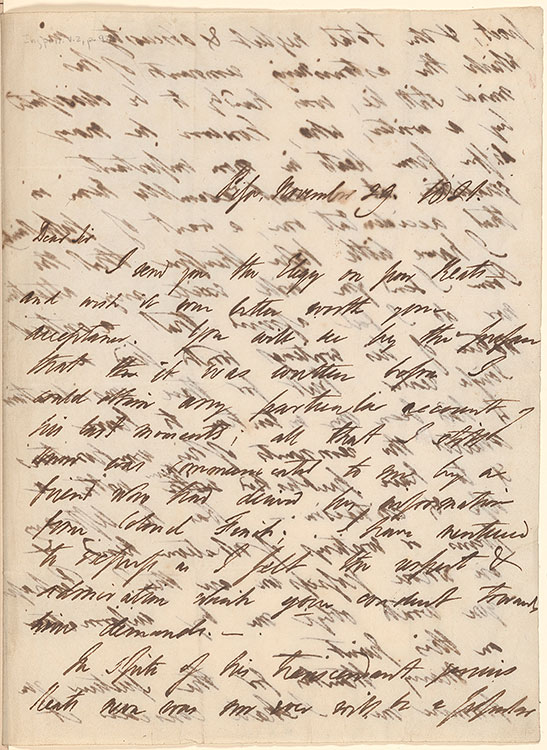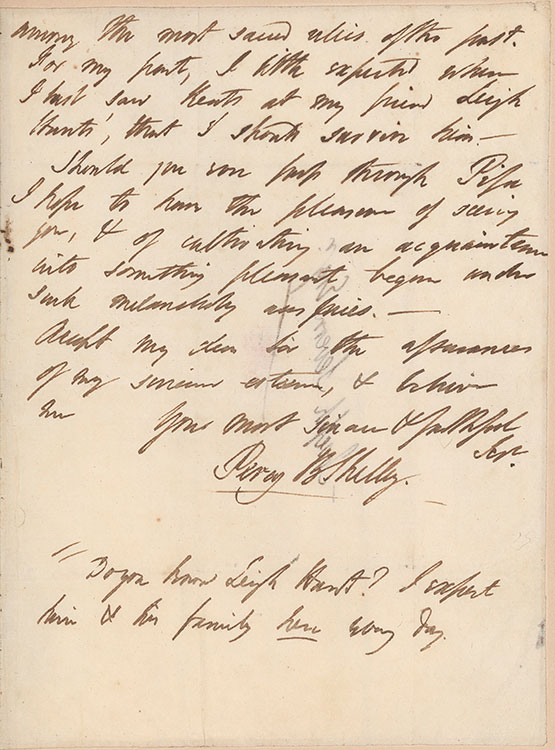“Oh, weep for Adonais—he is dead!”

Soon after Keats’s death, Percy Bysshe Shelley wrote what is arguably the most famous literary elegy in English. Yet Adonais has done much to distort its subject’s reputation, characterizing Keats as exceedingly weak and fragile—as a “nursling,” a “gentle child,” a “pale flower” withered by bad reviews. Shelley reinforced these notions in his preface to Adonais, where he attributes Keats’s death to negative press directed at Endymion:
The savage criticism on his Endymion, which appeared in the Quarterly Review, produced the most violent effect on his susceptible mind; the agitation thus originated ended in the rupture of a blood-vessel in the lungs; a rapid consumption ensued, and the succeeding acknowledgments from more candid critics, of the true greatness of his powers, were ineffectual to heal the wound thus wantonly inflicted.
 Shelley gave this copy of Adonais to Keats’s deathbed companion, Joseph Severn, as recorded in a handwritten note on the title page: “J. Severn— Rome 1821 given [to] me by Shelley shortly before his death.” Severn marked several passages in the volume, including those that imagine fellow poets Lord Byron (“The Pilgrim of Eternity”) and Shelley (“a pardlike Spirit beautiful and swift”) mourning Keats. Another marked passage draws attention to the critics allegedly responsible for Keats’s decline, here figured as “herded wolves” and “obscene ravens, clamorous o’er the dead.”
Shelley gave this copy of Adonais to Keats’s deathbed companion, Joseph Severn, as recorded in a handwritten note on the title page: “J. Severn— Rome 1821 given [to] me by Shelley shortly before his death.” Severn marked several passages in the volume, including those that imagine fellow poets Lord Byron (“The Pilgrim of Eternity”) and Shelley (“a pardlike Spirit beautiful and swift”) mourning Keats. Another marked passage draws attention to the critics allegedly responsible for Keats’s decline, here figured as “herded wolves” and “obscene ravens, clamorous o’er the dead.”
The Morgan additionally owns the letter Shelley sent Severn to accompany the volume. Undoubtedly with a dose of affected modesty, Shelley characterizes his “Elegy on poor Keats” as deficient, written “before [he] could attain any particular account of his [i.e., Keats’s] last moments.” He continues with a well-known pronouncement on the literary reputation of Keats; according to Shelley, neither poet will ever become popular:
In spite of his transcendent genius Keats never was nor ever will be a popular poet, & the total neglect & obscurity in which the astonishing remnants of his mind still lie, was hardly to be dissipated by a writer, who, however he may differ from Keats in more important qualities, at least resembles him in that accidental one, a want of popularity.
Shelley also speaks to a nascent interest in Keats’s literary remains, “the remnants of his compositions”: “Has he left any poems or writings of whatever kind, & in whose possession are they?” Despite Shelley’s prediction that Keats’s work will languish in “total neglect & obscurity,” interest in his life and poetry would only increase over the nineteenth century, culminating in the first major scholarly work on the poet, Richard Monckton Milnes’s Life, Letters and Literary Remains of John Keats (1848).
Percy Bysshe Shelley, Adonais: An Elegy on the Death of John Keats, Author of “Endymion,” “Hyperion” Etc. Pisa: with the types of Didot, 1821, pp. 16–17. PML 20023. Purchased by Belle da Costa Greene on behalf of J. P. Morgan, Jr., 1915.
Percy Bysshe Shelley letter to Joseph Severn, p.1

Percy Bysshe Shelley, letter to Joseph Severn, 29 November 1821, p. 1. MA 790.2. Purchased by J. Pierpont Morgan, 1911.
p. 1
Pisa, November 29. 1821
Dear Sir
I send you the Elegy on poor Keats
and wish it was better worth your
acceptance. You will see by the preface
that the it was written before I
could attain any particular account of
his last moments; all that I still
know was communicated to me by a
friend who had derived his information
from Colonel Finch; I have ventured
to express as I felt the respect &
admiration which your conduct towards
him demands.—
In spite of his transcendent genius
Keats never was nor ever will be a popular
Percy Bysshe Shelley letter to Joseph Severn, p.2

Percy Bysshe Shelley, letter to Joseph Severn, 29 November 1821, p. 2. MA 790.2. Purchased by J. Pierpont Morgan, 1911.
p. 2
poet, & the total neglect & obscurity in
which the astonishing remnants of his
mind still lie, was hardly to be dissipated
by a writer, who, however he may
differ from Keats in more important
qualities, at least resembles him in
that accidental one, a want of popularity.
I have little hope therefore that the
Poem I sent you will excite any attention
nor do I feel assured that a critical
notice of his writings would find a
single reader. But for these considerations
it had been my intention to have
collected the remnants of his compositions
& to have published with them with a
life & criticism.– Has he left any
poems or writings of whatever kind, &
in whose possession are they? Perhaps
you would oblige me by information
on this point.—
Many thanks for the picture you
promise me: I shall consider it
Percy Bysshe Shelley letter to Joseph Severn, p.3

Percy Bysshe Shelley, letter to Joseph Severn, 29 November 1821, p. 3. MA 790.2. Purchased by J. Pierpont Morgan, 1911.
p. 3
among the most sacred relics of the past.
For my part, I little expected when
I last saw Keats at my friend Leigh
Hunts’, that I should survive him.—
Should you ever pass through Pisa
I hope to have the pleasure of seeing
you, & of cultivating an acquaintance
into something pleasant begun under
such melancholy auspices.—
Accept my dear sir the assurances
of my sincere esteem, & believe
me
Your most sincere & faithful ser[vant].
Percy B. Shelley
Do you know Leigh Hunt? I expect
him & his family here every day.